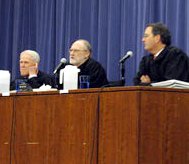4/5/2011
Federal Appeals Court Defends Red Light CamerasNinth Circuit appellate judges create ruling to defend Washington red light camera program.

Judges in the country's most activist federal circuit on Thursday ruled in favor of red light camera use in Washington state. A three-judge panel of the Ninth Circuit US Court of Appeals issued an unpublished memorandum order dismissing a state law challenge to the photo fine amounts and "cost neutrality" compensation arrangements of municipalities.
Lawyers for ticket recipients had originally filed their argument in King County Superior Court, but American Traffic Solutions (ATS), which operates the cameras, has learned that the federal bench is far more sympathetic to their business. ATS successfully moved to have the case transferred to a US district court where it prevailed last year (view ruling). Daniel F. Johnson, the lawyer who represented the motorists, argued the case had no business being decided by federal judges.
"Because this is a distinctly local controversy, it should be ordered remanded to state court," Johnson argued in briefs filed with the court.
The appellate court was not interested in sending the case back. Instead, it allowed no discovery, development of the record or consideration of the intent of Evergreen State lawmakers. State law says that red light camera fines shall not exceed the amount of the city's parking tickets, and ATS argued that the provision allows the fine to be as high as $250, the cost set by the state for parking in a handicapped zone without a permit. Johnson argued that the law, which is worded as a limitation, would be utterly pointless unless it were reduced fines to $20 or $40 -- a position confirmed by floor statements made by the state senator who wrote the law. The judges sided with ATS.
"Because the plain language of section 46.63.170(2) unambiguously authorizes the fines the defendants impose, we are precluded from considering the plaintiffs' argument that the legislative history compels a contrary conclusion," the appellate judges wrote.
Johnson also argued that a state law forbidding cities from compensating photo ticketing vendors based on the amount of revenue generated meant that "cost neutrality" arrangements violated the legislature's intention to eliminate a financial incentive for vendors to issue more tickets. The motorists' lawyers argued that up to a certain level, the contracts effectively pay vendors on a per ticket basis. Again, the Ninth Circuit disagreed.
"The cost neutrality provisions alter the timing of fee payments in accordance with monthly revenue fluctuations, but they do not base the amount of fees upon a portion of the revenue generated," the appellate judges wrote.
The judges went further to argue that the $5 per ticket fee charged after the first 800 citations were issued was not compensation based upon the amount of citations issued. A copy of the decision is available in a PDF file at the source link below.


